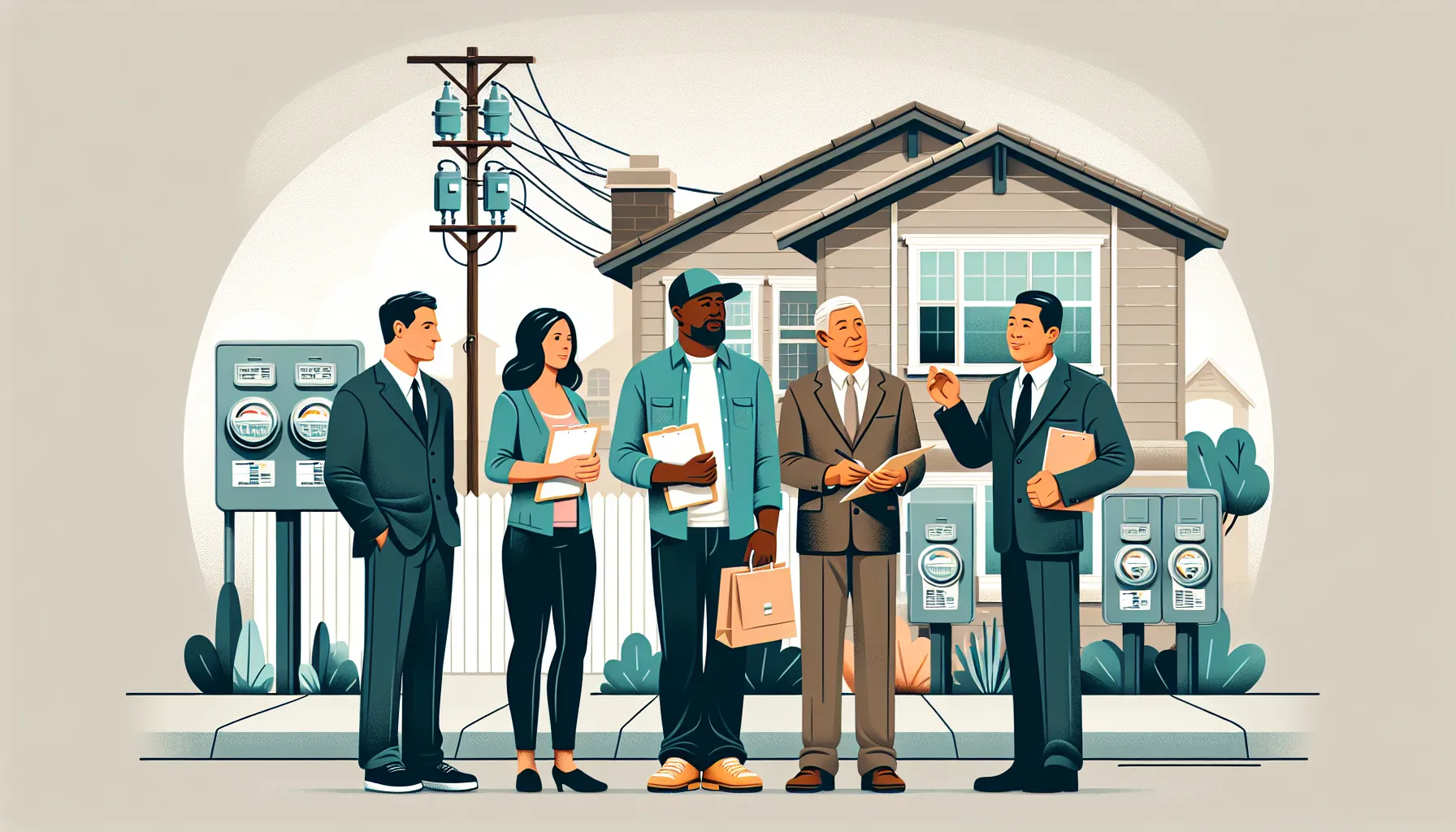Key Takeaways
- Clear planning is essential for tenant utilities management in Concord: Define responsibilities for electricity, water, gas, and internet to avoid confusion and disputes.
- Lease agreements should outline utility responsibilities: Include details on account setup, payments, and shared costs to create transparency.
- Concord’s unique challenges require proactive strategies: Address issues such as fluctuating utility rates, local regulations, and shared utility usage to prevent conflicts.
- Use apps and technology for utility management: Simplify tasks like bill tracking, payment scheduling, and expense sharing to improve efficiency and communication.
- Leverage local resources and support programs: Utilize community assistance and government services for smoother utility setup and cost management.
- Encourage energy efficiency to balance costs: Promote energy-saving practices and consider upgrades like programmable thermostats for financial and environmental benefits.
Planning utilities for tenants in Concord can feel overwhelming, especially with so many factors to consider. From setting up accounts to determining who handles which bills, it’s easy to feel unsure about where to start. Have you ever wondered how to simplify this process while keeping everything organized and efficient?
Managing utilities doesn’t have to be stressful. By understanding local requirements and making clear agreements with tenants, you can create a smooth system that works for everyone. What steps can you take to avoid confusion and ensure all responsibilities are clearly defined? Let’s explore practical ways to make tenant utilities planning easier and more effective.
Understanding Tenant Utilities Planning
Tenant utilities planning involves organizing how tenants access and manage services like electricity, water, gas, and internet. A well-structured approach helps both landlords and tenants avoid misunderstandings and ensures smooth day-to-day operations.
What Is Tenant Utilities Planning?
Tenant utilities planning refers to the process of assigning responsibility for utility accounts and bills between landlords and tenants. It often includes determining who sets up the accounts, how payments are handled, and whether any utilities remain in the landlord’s name. Many landlords prefer tenants to establish accounts directly with service providers, while others keep utilities under a master account and include the cost in the rent.
For example, utilities such as water and sewer may stay under the property owner’s name for billing simplicity, but electricity and internet services might transfer entirely to the tenant. Clear agreements detailing these arrangements can help avoid disputes later.
Importance Of Effective Utilities Management
Effective utilities management creates a stable rental experience for everyone. Unclear or improvised plans can lead to billing disputes, late payments, or service interruptions. With proper planning, landlords know their responsibilities and tenants feel secure in their arrangements.
Clear communication benefits everyone. Have you considered sharing a written outline of utility responsibilities in the lease agreement? Doing so provides a transparent reference point and avoids future confusion. Additionally, reviewing local utility regulations can save time addressing compliance issues later.
A consistent utilities plan also protects a property’s operational flow. For instance, semi-annual inspections can identify hidden costs like leaks or outdated systems, reducing financial surprises. Both tenants and property owners benefit when services run efficiently and without interruption.
Tenant Utilities Planning In Concord

Organizing tenant utilities in Concord involves understanding local utility services and defining clear responsibilities. Proper planning minimizes confusion and supports a smooth experience for renters and property owners.
Key Utilities To Consider In Concord
Utilities in Concord generally include electricity, water, gas, internet, and trash services. Each service requires proper setup to avoid service delays. Deciding who handles account creation—whether the landlord or the tenant—helps establish accountability.
Electricity and gas services usually need tenants to set up accounts under their names. This approach transfers billing responsibilities directly to tenants. Water services might differ based on property type; some landlords retain a single account and bill tenants monthly. Internet and trash services can vary, with many properties bundling these costs into the rent. Have you considered simplifying billing by consolidating some utilities into flat fees?
Landlords can establish expectations in lease agreements. For example, including language about on-time utility payments or shared costs for specific services, like yard irrigation, can reduce misunderstandings.
Challenges Specific To Concord
Managing utility services in Concord presents unique logistical obstacles for landlords and investors. Concord’s specific billing cycles and potential variations in service provider options can create hurdles. Local ordinances may also include regulations impacting cost allocations between landlords and tenants. Missteps in interpreting these guidelines might lead to disputes or unexpected expenses.
Another challenge involves fluctuating rates for utilities like water during drought seasons. Accounting for such fluctuations in leases helps both parties avoid surprises. How do you currently tackle unexpected changes in utility rates?
Additionally, properties with multiple tenants might encounter conflicts over shared utilities. Setting clear payment and usage guidelines upfront will prevent disagreements. Including inspections to check for unnecessary water or energy use is another way to maintain efficient utility practices.
Tips For Effective Utilities Planning

Thoughtful utilities planning sets the foundation for a smooth tenant experience. Focusing on organization and clear agreements can help avoid confusion or disputes.
Communication Between Tenants And Landlords
Clear communication strengthens the relationship between tenants and landlords. Discuss utility responsibilities during lease signings to clarify expectations. For example, who will set up electricity and water accounts? Including these details in the lease gives both parties a clear reference point. Do you check in with tenants regularly to address questions about utility concerns? Open dialogue prevents future misunderstandings.
Balancing Costs And Efficiency
Striking the right balance between cost savings and effective utility use benefits everyone. Encourage tenants to adopt energy-efficient practices, such as using LED light bulbs or unplugging unused devices. If you’re a landlord managing utilities, consider investing in upgrades like programmable thermostats to lower energy expenses. Are your current utility arrangements cost-effective for both you and your tenants?
Leveraging Local Resources And Support
Take advantage of local programs and resources to handle utilities more effectively. Some cities offer rebates for water-efficient appliances or energy-saving solutions. Community support organizations might help tenants with financial challenges related to utility bills. Are you familiar with incentives or assistance available in your area? Researching these options can simplify your planning process.
Tools And Resources For Utilities Planning In Concord

Planning tenant utilities in Concord can feel overwhelming without the right tools and support. Leveraging tech solutions and community resources can simplify this process and make account management more efficient.
Utility Management Apps
Utility management apps are excellent for streamlining tasks like bill tracking and usage monitoring. These tools allow tenants and landlords to access important data and maintain transparency. Many apps offer features like automated reminders, expense splitting, and payment scheduling to reduce billing errors or missed payments.
Some apps provide detailed usage reports for electricity, water, and gas. These insights can help tenants identify patterns to lower costs and conserve energy. Do you have tenants sharing a unit? Look for apps that accommodate shared expenses to minimize disputes.
Keeping an app as a central platform also eliminates the confusion from juggling multiple service accounts. Simplicity in communication is key—how do you currently address utility-related questions?
Local Government And Community Assistance
Local services in Concord can help with utilities-related needs. The city government often provides online portals for setting up services like trash collection, water accounts, or energy provider connections. These tools make getting started faster and more direct.
Community assistance programs can be helpful for tenants who qualify for utility payment support. Seasonal funds for heating or cooling bills may reduce the strain during temperature extremes. Reach out to tenants—are they aware of these resources?
Your local government’s websites often outline regulatory details for splitting costs and billing support programs for multi-tenant properties. Accessing these can help you create fair, informed agreements with renters while avoiding legal complications.
By using the right apps and tapping into community resources, you’ll create a smoother process for managing utilities. How could integrating these tools improve your current system?
Conclusion
Planning tenant utilities in Concord doesn’t have to be overwhelming. By focusing on clear communication, leveraging local resources, and utilizing technology, it’s possible to create a seamless process that benefits both landlords and tenants. Taking the time to establish well-defined responsibilities and efficient systems ensures a smoother rental experience while avoiding unnecessary conflicts or disruptions. With the right approach, utilities management becomes a straightforward part of property management, fostering a more positive and stress-free environment for everyone involved.
Frequently Asked Questions
What are the main utilities tenants need to plan for in Concord?
Tenants in Concord typically need to plan for electricity, gas, water, internet, and trash services. Some properties may require tenants to set up accounts directly, while others may include certain utilities in the rent. Discussing details with the landlord is recommended to avoid misunderstandings.
Who is responsible for utility payments in a rental property?
Responsibility for utility payments depends on the lease agreement. Some landlords require tenants to set up and manage accounts, while others maintain master accounts and bill tenants directly. Clear communication in the lease avoids disputes.
How can clear utility agreements benefit landlords and tenants?
Clear utility agreements prevent confusion, disputes, and interruptions in services. By outlining responsibilities in the lease, both landlords and tenants can manage costs better and avoid misunderstandings about payment and usage.
Are there any unique challenges for managing utilities in Concord?
Yes, Concord has specific local regulations, billing cycles, and fluctuating costs, especially during droughts. Planning ahead and understanding these factors can help avoid service delays and manage costs effectively.
What steps can tenants take to ensure efficient utility usage?
Tenants can adopt energy-efficient practices such as using LED lighting, minimizing water wastage, and turning off unused appliances. These habits reduce utility bills and environmental impact.
How can landlords streamline utility management for properties with multiple tenants?
Landlords can use utility management apps to track expenses, monitor usage, and allocate costs among multiple tenants. Including clear utility guidelines in lease agreements can further simplify management.
Should utility responsibilities be discussed during lease signing?
Yes, discussing utility responsibilities during lease signing clarifies expectations and prevents conflicts. Both parties should ensure utility terms are clearly outlined in writing.
What tools can help with utility management in Concord?
Utility management apps, local government portals, and community assistance programs are great tools. These resources simplify bill tracking, account setup, and payment support, making the process smoother for both landlords and tenants.
How can landlords save costs on utilities in rental properties?
Landlords can save costs by using energy-efficient appliances, upgrading insulation, and leveraging local rebates for energy-saving improvements. These steps lower expenses and improve tenant satisfaction.
What should tenants do if they face issues with utility payments?
Tenants facing financial difficulties should explore local community assistance programs or discuss payment plans with utility providers. Open communication with landlords can also help in finding a temporary solution.
